Investigating the efficacy of baricitinib in new onset type 1 diabetes mellitus (BANDIT)—study protocol for a phase 2, randomized, placebo-controlled trial.
Published Date:
December 7, 2023.
Published By:
Waibel, H. E. Thomas,J. M. Wentworth,. J. Couper,5 R. J. MacIsaac, F. J. Cameron,8 M. So, B. Krishnamurthy, M. C. Doyle, and T. W. Kay corresponding author.
Approved By:
To be
Decoded By:
Asra H. Ahmed MBA, PGCE in Assessment Learning disability, Diabesties Foundation
10 mins to read
- The T1D Takeaway
- A Reversal of T1D. Wait…What?!? There is potential of hope that persons newly diagnosed with type 1 diabetes can with, daily treatment with baricitinib over period save beta-cell function. This may further lead to reversal of type 1 diagnosis.
Word Wizard
- Type 1 diabetes (T1D) is challenging for individuals, and the healthcare system.
- Despite improved technology, many T1D patients struggle to control blood sugar, facing immediate and long-term risks.
- A randomized, controlled trial of 91 individuals newly diagnosed with Type 1 Diabetes were included in the JAK-STAT pathway is crucial for the immune attack on insulin-producing cells in T1D.
- Research indicates that JAK1/JAK2 inhibitors can prevent and reverse diabetes in mice.
- The study’s goal is to see if the JAK1/JAK2 inhibitor baricitinib can reduce T1D-related immune issues and protect beta cell function. randomized, controlled trial of 91 patients.

Summary Snap
Shots
This research aims to find out if a medicine called baricitinib can help lower the immune problems in type 1 diabetes and keep the beta cells working and produce insulin from within.
Prime Insight
The aim of this study is to assess whether the JAK inhibitor baricitinib can slow the progressive, immune-mediated loss of beta cell mass and function that occurs after clinical presentation. This will be measured via plasma C-peptide, a surrogate marker of insulin secretion.
Janus Kinase Pathway is a way of using medication that interferes with using enzymes involved in signaling between cells to change autoimmune response within the body that can lead to beta cell destruction. When these molecules bind, Janus kinases (JAKs) activate the receptors.
In a JDRF-funded clinical trial, published in the renowned New England Journal of Medicine, Thomas Kay, M.B.B.S., Helen Thomas, Ph.D., and others demonstrated that baricitinib—a JAK inhibitor, which is critical to signaling pathways within both immune cells and beta cells in type 1 diabetes (T1D)—preserved beta cell function in the disease. Further, this medication has been previously approved by FDA for other autoimmune conditions.

The study is the first to test if JAK inhibitors can slow down Type 1 Diabetes (T1D) in both children and adults. It aims to understand how these inhibitors impact T1D progression. The research will provide insights into the effects of baricitinib in cells producing insulin.
Activated receptors then bind to cellular response proteins, regulating gene. A process by which information in a gene is used to synthesize a protein. In autoimmune diseases, JAK-STAT and interferon signaling are crucial pathways. Blocking or removing individual signaling molecules/receptors has limited impact compared to manipulating the entire signaling pathway.
C-peptide levels over 2 hours after a meal test at 48 weeks was measured. Changes in C-peptide levels, daily insulin use, HbA1c levels were evaluated. Glucose levels, using a CGM were recorded and potential side effects were noted.

The study suggests that baricitinib may help preserve beta-cell function in recent-onset type 1 diabetes.
- A Deeper Dive
- Studies with baricitinib have also been carried out for inflammatory bowel disease (both ulcerative colitis and Crohn’s disease), psoriasis and psoriatic arthritis, atopic dermatitis, ankylosing spondylitis and systemic lupus erythematosus. FDA has approved its use in other conditions and further research in type 1 diabetes can help consolidate earlier promising results.
- Can combining the newly developed research with baricitinib be effective if used in conjunction with other therapies, such as Tzield™ (teplizumab-mzwv) or verapamil ? Furter, advances and combination treatment do offer many possibilities and hope for our future.
- The Sources Voice
In patients with type 1 diabetes of recent onset, daily treatment with baricitinib over 48 weeks appeared to preserve β-cell function as estimated by the mixed-meal–stimulated mean C-peptide level.
- Curiosities Clarified
Baricitinib is a Janus kinase (JAK) inhibitor that is primarily used in the treatment of rheumatoid arthritis and other autoimmune conditions. The conclusions of the above study has shown very prosimising results among those who were treated in early stages of Type 1 diabetes.
The trial showed significant preservation of Beta cells. That’s super exciting for people living with type 1 diabetes as cure is still being researched at least their own Beta cells may be preserved for longer.
Baricitinib realistically speaking is not a cure, but it surely can preserve Beta cells and delay the onset of diabetes. The production of insulin is very promising.

47 Comments
Mostbet-এ অংশ গ্রহণ করুন – আপনার সময়ের
জন্য Mostbet BD
Jogo Fortune Dragon Grátis é perfeito para diversão .
Ganhe com bônus em cassinos como 1Win . Experimente a demo !
fortune dragon gratis
Jogo Fortune Dragon Grátis é cheio de emoção.
Ganhe com bônus em cassinos como MegaPari. Jogue agora !
fortune dragon slot
Slot Fortune Dragon Demo é cheio de emoção.
Ganhe com bônus em cassinos como MegaPari.
Descubra o dragão! fortune dragon gratis
أمثلة عملية نافعة! أحسن من الكلام النظري!
1xbet
Your comment is awaiting moderation.
mostbet Кыргызстан Feel the rush
of victory!
Experience the excitement of slot machines!
Join our special promotions!
Become a member today!
Your luck is waiting!
Tell everyone about us!
Huge thanks for being part of us!
Very thrilling!
You are a true expert!
Following your new jackpots!
Bookmarked your content in my favorites!
You’re amazing!
Will share with friends!
Thanks for the entertaining event!
Very inspiring!
You are a talented VIP! mostbet
mostbet hu
mostbet рабочее зеркало
mostbet np
Your comment is awaiting moderation.
mostbet Azərbaycan Feel the rush
of victory!
Experience the excitement of slot machines!
Follow us for latest news!
Subscribe to our updates for more!
Experience the thrill of gaming with us!
Save and present our offers!
Appreciate your loyalty!
Very encouraging!
Your talent always result in victories!
Waiting for your next tournaments!
Now I’m a follower!
Thrilling!
Will share with on social media!
Thank you for your help!
Very reliable!
Our platform is amazing! mostbet зеркало
mostbet играть
mostbet play
mostbet
Your comment is awaiting moderation.
зеркало мостбет Spin to win big!
Enjoy generous rewards!
Join our loyalty program!
Don’t miss out on huge jackpots!
Feel the thrill!
Tell your community about us!
Thank you for your comments!
Very rewarding!
You are a successful winner!
Waiting for your latest events!
Now I’m a winner!
Rewarding!
Definitely telling about you!
Grateful for the amazing site!
Very encouraging!
Your efforts always are rewarded! mostbet
mostbet 2025
mostbet
mostbet Узбекистан
Mostbet Sverige – populär spelplattform för kasinospel.
Mostbet Pakistani bettors, Jesse, Pakistan – complete platform for casino games .
Mostbet BD tətbiqi ilə hər yerdə oynayın Mostbet BD
MostBet Casino – monipuolinen kasino kokeneille pelaajille .
Mostbet Finland
دائماً ألعب في 1xbet Sports Betting Egypt –
مضمون ورائع! أوصي به الآن!
Online betting in Egypt
Tus ganancias están a un paso de distancia. Regístrate en 1Win y disfruta de su excelente
atención.
1win descargar
Your comment is awaiting moderation.
Access Bet9ja Old Mobile Version – Fast, Simple, and Secure!
old bet9ja mobile login
Want a quick betting interface? Bet9ja’s Old Mobile version offers users a simple way to
place bets, with no complicated features. Access popular betting options, from soccer to casino games, and take advantage of
attractive promotions.
old bet9ja
আপনি কি ক্রিকেট বা অন্য কোন
ইভেন্টে বাজি ধরতে চান?
Melbet বাংলাদেশের অফিশিয়াল বুকমেকার হিসেবে আপনাকে বিভিন্ন
স্পোর্টস ইভেন্টে বাজি ধরার সুযোগ দেয়। আজই নিবন্ধন করুন!
melbet app
Mostbet مصر
Mostbet KZ – инновациялық платформа
болып табылады мобильді қосымша
сүйінушілеріне. mostbet kazakhstan
Nutzen Sie Cashback-System und genießen Sie mobile App.
Here is my blog Mostbet Online Casinos
Téléchargez l’application mobile – sécurisé et fiable .
Visitez Mostbet
Присоединяйтесь к Mostbet прямо сейчас и участвуйте в турнирах.
mostbet вход
mostbet ua – ідеальний вибір для онлайн казино .
mostbet ua
Mostbet CL Chile – soporte al cliente 24/7
.
Kazino oyunları – əla seçimdir kazino oyunları üçün istifadəçilər üçün. mostbet promo kod
Bejelentkezés a Mostbet
Mostbet-də qeydiyyatdan keçin – hər kəs üçün əlçatan və rahat platformadır.
mostbet az
Мобилдик тиркеме – ыңгайлуу жана чуркай эмес .
Mostbet kg
Marzysz o wielkiej wygranej? jest platformą dla prawdziwych graczy .
Zakłady sportowe – to tylko początek Twojej przygody.
Dołącz do nas! mostbet casino (Scot)
Mostbet Portugal – opção confiável para apostas .
Oferece apostas desportivas emocionantes .
Mostbet Portugal
Mostbet CZ – podpora pro české hráče .
Regístrate ahora y disfruta de programa de lealtad con beneficios especiales.
Also visit my site :: Mostbet CO bonos
Mostbet România – experiență unică pentru jocuri de cazino .
Mostbet Türkiye
– kullanıcı dostu arayüzüyle dikkat çeker spor bahisleri yapmak isteyenler için mükemmeldir.
लाइव कैसीनो गेम्स का
आनंद लें . mostbet aviator
Mostbet UZ – bu sport va kazino o’yinlari uchun ideal sayt, bunda siz kazino o’yinlari imkoniyatiga ega bo’lasiz.
Ro’yxatdan o’ting va 3,000,000 UZS bonus dan foydalaning.
Mostbet kirish
Your comment is awaiting moderation.
تحميل برنامج 1xbet لعب الكازينو على الإنترنت – النسخة المصرية
Very useful information; I learned a lot of new things!
تحميل 1xbet: استمتع بألعاب الكازينو على الإنترنت في مصر – Funke Schlüsseldienst
Your comment is awaiting moderation.
Assistenza dedicata su GratoWin: Risolve ogni problema.
grato win
Iscrizione rapida su GratoWin: inserisci i tuoi dati
e inizia subito a giocare. Nessuna complicazione per entrare nel mondo del
gioco. Non aspettare.
gratowin it
https://winnita-promocode.com/
منصة مذهلة للمراهنات، Arabic 1xbet Champion يضمن أكثر ربحية الخدمات لعشاق المراهنات!
Segurança Pagbet
I join. All above told the truth. Let’s discuss this question.
https://continent-telecom.com/virtual-number-ukraine-kiev
https://car-rental-sharjah.com/
https://pastebin.com/u/arendaavtotbilisicom
https://tdedchangair.com/webboard/viewtopic.php?p=2383#p2383
https://construct.volyn.ua/Raznoe/dimohodi-ta-ventilyac-ya-u-bagatokvartirnih-promislovih-bud-vlyah
In my opinion you commit an error. I can defend the position. Write to me in PM, we will communicate.
https://femalecricket.com/women-cricket-news/54143-top-features-of-the-1xbet-app-you-should-know-about.html
Hey there, I appreciate you posting great content covering that topic with full attention to details and providing updated data. I believe it is my turn to give back, check out my website QH3 for additional resources about Cosmetics.
1xbet new account
куни иркутск
t1c5qy
i02wjd
dukx8l